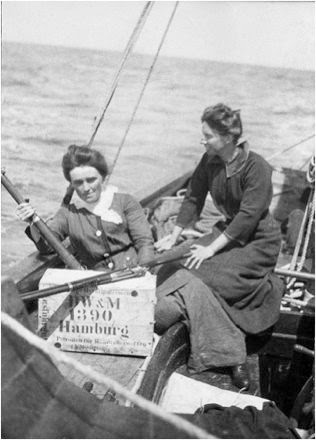Anniversary: The sentencing of Roger Casement, arms smuggler for Ireland.

Mary Spring-Rice with Molly Childers, smuggling 900 German Mauser M1871 11 mm calibre single shot rifles and 29,000 rounds of blackpowder cartridges on board the Asgard, 1914. These rifles were later used in the Easter Rising of 1916 in Dublin.
Today is the anniversary of the conviction of Sir Roger Casement on 29 June 1916 of the charge of treason to the British Empire, specifically of bringing German arms to Ireland with the aim of stirring an armed uprising.
Here is Casement's speech.
Since arms were so necessary to make our organization a reality and to give to the minds of Irishmen menaced with the most outrageous threats a sense of security, it was our bounden duty to get arms before all else. . . But let me say that I am prouder to stand here today in the traitor's dock to answer this impeachment than to fill the place of my accusers. If there be no right of rebellion against a state of things that no savage tribe would endure without resistance, then am I sure that it is better for men to fight and die without right than to live in such a state of right as this.
Where all your rights become only an accumulated wrong; where men must beg with bated breath for leave to subsist in their own land, to think their own thoughts, to sing their own songs, to garner the fruit of their own labours - and even while they beg to see these things inexorably withdrawn from them - then surely it is a braver, a saner, and a truer thing to be a rebel in act and deed against such circumstances as this than tamely to accept it as the natural lot of men.

2 comments:
I was not familiar with this story. Thanks, Mike, for bringing it to my attention. What I find interesting is that Sir Roger served the crown for decades with such fidelity that he was rewarded with a knighthood. Just 5 years later, he was hanged by the same crown as a traitor. It's a bit like a high official in one of those alphabet agencies suddenly realizing he has been serving the oppressor and switching sides - a rare event, indeed. I wonder what Sir Roger's Emmaus moment was that turned him from a collaborator into an activist and rebel?
Still, some can't see the south's secession in the same light as the Irish secession from the UK.
For shame.
Post a Comment